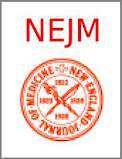JAMA:贝伐单抗与遗传性血管疾病患者心输出量改善有关
2012-03-08 MedSci MedSci原创
近日,国际医学杂志《美国医学会杂志》JAMA上的一项研究揭示,在一项包括有25名罹患遗传性出血性毛细血管扩张症(一种遗传性疾病,它会导致血管的异常)并因为这一疾病而有严重肝累及的病人的研究中,那些接受药物贝伐单抗的病人的心输出量会得到改善,其发生鼻衄的时间会缩短而且次数减少;而鼻衄是罹患这种疾病者的一种可能会威胁生命的并发症。 遗传性出血性毛细血管扩张症(HHT)是一种显性的遗传性血管疾病;
近日,国际医学杂志《美国医学会杂志》JAMA上的一项研究揭示,在一项包括有25名罹患遗传性出血性毛细血管扩张症(一种遗传性疾病,它会导致血管的异常)并因为这一疾病而有严重肝累及的病人的研究中,那些接受药物贝伐单抗的病人的心输出量会得到改善,其发生鼻衄的时间会缩短而且次数减少;而鼻衄是罹患这种疾病者的一种可能会威胁生命的并发症。
遗传性出血性毛细血管扩张症(HHT)是一种显性的遗传性血管疾病;它会影响多种器官,其中包括肺、胃肠道、肝和脑。根据文章的背景资料,人们观察到,有高达74%的这种病人会有肝脏的累及,而肝血管畸形会导致严重的并发症,其中包括高输出量心力衰竭。
法国Bron市LouisPradel医院的Sophie Dupuis-Girod, M.D., Ph.D.及其同事在有严重的与高心输出量有关的肝脏形式的HHT患者中对药物贝伐单抗的功效进行了分析。贝伐单抗是一种抗血管内皮生长因子的治疗药物,人们认为它可能会对治疗HHT有效。该单一中心的2期试验包括了被确诊有HHT、严重肝累及以及与HHT有关的高心脏指数的25名患者。参与者每14天会接受一次贝伐单抗治疗,他们总共会接受6次贝伐单抗的注射。治疗的全部时间为2.5个月;病人在治疗开始后会被随访长达6个月。该研究的主要检测结果是第一次注射后3个月时的由超声心动图评估的心输出量。
在24名可重新再读其超声心动图的病人中,这24名患者中有反应者达20人,其中心指数恢复正常者(有完全的反应)有3人,有部分反应者达17人,无反应者有4人。在治疗开始时的心指数中位数(中点)在治疗3个月后显著降低。在治疗后6个月时的心指数中位数比治疗前有了显著的下降。病人在被纳入研究时其平均鼻衄(鼻出血)时间为每月221分钟,但其在治疗开始后3个月时(134分钟)和6个月时(43分钟)则有了显著的减少。他们的生活品质也有了显著的改善。
Bevacizumab in Patients With Hereditary Hemorrhagic Telangiectasia and Severe Hepatic Vascular Malformations and High Cardiac Output
Sophie Dupuis-Girod, MD, PhD; Isabelle Ginon, MD; Jean-Christophe Saurin, MD, PhD; Denis Marion, MD; Elsa Guillot, MD; Evelyne Decullier, PhD; Adeline Roux, MsC; Marie-France Carette, MD, PhD; Brigitte Gilbert-Dussardier, MD, PhD; Pierre-Yves Hatron, MD, PhD; Pascal Lacombe, MD, PhD; Bernard Lorcerie, MD, PhD; Sophie Rivière, MD; Romain Corre, MD; Sophie Giraud, MD, PhD; Sabine Bailly, PhD; Gilles Paintaud, MD, PhD; David Ternant, MD; Pierre-Jean Valette, MD, PhD; Henri Plauchu, MD, PhD; Frédéric Faure, MD, PhD
Context:The only treatment available to restore normal cardiac output in patients with hereditary hemorrhagic telangiectasia (HHT) and cardiac failure is liver transplant. Anti–vascular endothelial growth factor treatments such as bevacizumab may be an effective treatment.
Objectives:To test the efficacy of bevacizumab in reducing high cardiac output in severe hepatic forms of HHT and to assess improvement in epistaxis duration and quality of life.
Design, Setting, and Patients:Single-center, phase 2 trial with national recruitment from the French HHT Network. Patients were 18 to 70 years old and had confirmed HHT, severe liver involvement, and a high cardiac index related to HHT.
Intervention:Bevacizumab, 5 mg per kg, every 14 days for a total of 6 injections. The total duration of the treatment was 2.5 months; patients were followed up for 6 months after the beginning of the treatment.
Main Outcome Measure:Decrease in cardiac output at 3 months after the first injection, evaluated by echocardiography. Results A total of 25 patients were included between March 2009 and November 2010. Of the 24 patients who had echocardiograms available for reread, there was a response in 20 of 24 patients with normalization of cardiac index (complete response [CR]) in 3 of 24, partial response (PR) in 17 of 24, and no response in 4 cases. Median cardiac index at beginning of the treatment was 5.05 L/min/m2 (range, 4.1-6.2) and significantly decreased at 3 months after the beginning of the treatment with a median cardiac index of 4.2 L/min/m2 (range, 2.9-5.2; P < .001). Median cardiac index at 6 months was significantly lower than before treatment (4.1 L/min/m2; range, 3.0-5.1). Among 23 patients with available data at 6 months, we observed CR in 5 cases, PR in 15 cases, and no response in 3 cases. Mean duration of epistaxis, which was 221 minutes per month (range, 0-947) at inclusion, had significantly decreased at 3 months (134 minutes; range, 0-656) and 6 months (43 minutes; range, 0-310) (P = .008). Quality of life had significantly improved. The most severe adverse events were 2 cases of grade 3 systemic hypertension, which were successfully treated.
Conclusion:In this preliminary study of patients with HHT associated with severe hepatic vascular malformations and high cardiac output, administration of bevacizumab was associated with a decrease in cardiac output and reduced duration and number of episodes of epistaxis.
本网站所有内容来源注明为“梅斯医学”或“MedSci原创”的文字、图片和音视频资料,版权均属于梅斯医学所有。非经授权,任何媒体、网站或个人不得转载,授权转载时须注明来源为“梅斯医学”。其它来源的文章系转载文章,或“梅斯号”自媒体发布的文章,仅系出于传递更多信息之目的,本站仅负责审核内容合规,其内容不代表本站立场,本站不负责内容的准确性和版权。如果存在侵权、或不希望被转载的媒体或个人可与我们联系,我们将立即进行删除处理。
在此留言










#遗传性#
42
#疾病患者#
39
#心输出量#
37
#贝伐#
33
#血管疾病#
29